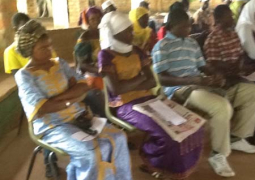Yesterday, Africans in Africa and Diaspora Africans celebrated the 54th anniversary of the founding of the Organisation of African Unity that spearheaded decolonisation of the continent up to 2002, when it passed the baton to the African Union which was given the special brief of bringing holistic independence.
On
May 25, 1963, leaders of 30 of the 32 independent African states signed the
union’s founding charter in Addis Ababa, Ethiopia. In 1991, the OAU established the African
Economic Community, and in 2002 the OAU established its own successor, the
African Union.
However,
while the name and date of Africa Day has been retained as a celebration of
continental unity, a cursory look at many a member states’ calendar will show
that the day is officially observed in only eight out of 54 African countries.
Shocking
but true. Only Ghana, Gambia, Mali, Namibia, Mauritania, Lesotho, Zambia and
Zimbabwe officially designate Africa Day as an official holiday.
In
other countries, including South Africa, home to the continent’s oldest
liberation movement the ANC; and Ethiopia, which houses the AU headquarters
Africa Day is informally observed as Africa Liberation Day: mainly a preserve
of activists and scholars. That about sums up the state of the union of Africa
and the seriousness with which the current crop of African leaders approach
issues of continental unity.
In
fact, Africa flunked the crucial test during the fourth EU-Africa Summit when
the condescending Westerners gave themselves the role of deciding who could
constitute African delegations, even though the two continents were supposed to
meet as equals.
The
African Union Peace and Security Council, the AU organ tasked with enforcing
union decisions, recommended that African leaders boycott the Brussels indaba
till Europeans treated African leaders as equals.
But
when the Summit opened, 36 African countries were in attendance even though the
EU had trashed African decisions and principles by inviting Egypt, which was
suspended from the councils of the AU in the wake of a military coup that
deposed the democratically elected Mohammed Morsi.
The
Saharawi Arab Democratic Republic, a full member of the African Union, was not
invited, yet Morocco, which occupied the SADR and left the OAU in protest in
1986, was invited.
If
ever there was a greater insult to the union it was this decision to disregard
the AU’s own protocols and principles. And yet 36 African countries saw nothing
wrong with that.
And
yesterday, the African Union turned 54 with the erstwhile coloniser on the
continent to look for over 200 girls abducted by the Nigerian Islamist militia,
Boko Haram. If ever there was cause to self-flagellate, it is this.
How
can we look to our historical violators to save our own daughters? Today should
thus be a day of introspection when every African should take stock of what
he/she has done over the past year to promote the realisation of the noble goals
of the continent’s founding fathers whose vision, as articulated by Ghana’s
founding president Dr Kwame Nkrumah, was of an independent African who was ever
ready to fight his own battles and prove that, contrary to the white
supremacist doctrine, the black man is capable of managing his own affairs.
Dr
Nkrumah wanted us all to demonstrate to the world and other nations that young
as we were, we were prepared to lay our own foundations for self-rule and
development.
It
is time to take stock.
Guest
editorial
“Well
done is better than well said. ”
Benjamin
Franklin
Read Other Articles In Article (Archive)



